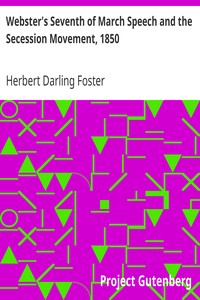Webster's Seventh of March Speech and the Secession Movement, 1850 by Foster
"Webster's Seventh of March Speech and the Secession Movement, 1850" by Herbert Darling Foster is a historical account written in the early 20th century. This book delves into the political tensions surrounding slavery and the prospect of secession in the United States during the mid-19th century. Specifically, it focuses on Daniel Webster's famous speech delivered on March 7, 1850, which sought to reconcile the opposing forces of abolitionists and pro-slavery advocates as
the nation grappled with the implications of gaining new territory from the Mexican War. The book analyzes the context leading up to the speech, emphasizing the pressing danger posed by the secessionist movement in the South and exploring the divisions within the Southern states. Foster presents evidence demonstrating that Webster aimed to preserve the Union through compromise, despite facing criticism from abolitionists who labeled him a traitor. By using letters and contemporary accounts, Foster argues that Webster's speech ultimately played a crucial role in temporarily cooling tensions between the North and South, allowing for a delay in the secessionist agenda. The work serves not only as a historical recounting of a pivotal moment but also as a reevaluation of Webster's intentions and the political climate of the time. (This is an automatically generated summary.)
Read or download for free
| Reading Options | Url | Size | |||
|---|---|---|---|---|---|
| Read now! | https://www.gutenberg.org/ebooks/1663.html.images | 138 kB | |||
| EPUB3 (E-readers incl. Send-to-Kindle) | https://www.gutenberg.org/ebooks/1663.epub3.images | 146 kB | |||
| EPUB (older E-readers) | https://www.gutenberg.org/ebooks/1663.epub.images | 146 kB | |||
| EPUB (no images, older E-readers) | https://www.gutenberg.org/ebooks/1663.epub.noimages | 98 kB | |||
| Kindle | https://www.gutenberg.org/ebooks/1663.kf8.images | 380 kB | |||
| older Kindles | https://www.gutenberg.org/ebooks/1663.kindle.images | 372 kB | |||
| Plain Text UTF-8 | https://www.gutenberg.org/ebooks/1663.txt.utf-8 | 99 kB | |||
| Download HTML (zip) | https://www.gutenberg.org/cache/epub/1663/pg1663-h.zip | 146 kB | |||
| There may be more files related to this item. | |||||
Similar Books
About this eBook
| Author | Foster, Herbert Darling, 1863-1927 |
|---|---|
| Commentator | Stephenson, Nathaniel W. (Nathaniel Wright), 1867-1935 |
| Title | Webster's Seventh of March Speech and the Secession Movement, 1850 |
| Alternate Title | Webster's 7th of March Speech and the Secession Movement, 1850 |
| Credits | Produced by Dianne Bean, and David Widger |
| Reading Level | Reading ease score: 61.4 (8th & 9th grade). Neither easy nor difficult to read. |
| Language | English |
| LoC Class | E300: History: America: Revolution to the Civil War (1783-1861) |
| Subject | Webster, Daniel, 1782-1852. Seventh of March speech |
| Subject | Secession |
| Category | Text |
| EBook-No. | 1663 |
| Release Date | Mar 1, 1999 |
| Most Recently Updated | Feb 2, 2013 |
| Copyright Status | Public domain in the USA. |
| Downloads | 705 downloads in the last 30 days. |
| Project Gutenberg eBooks are always free! | |

